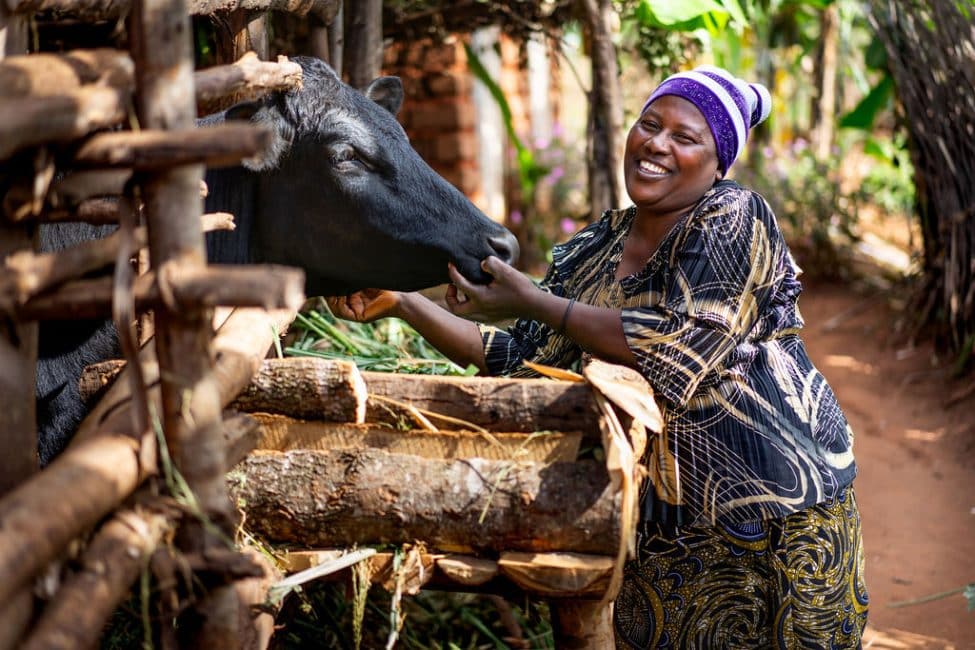Originally from the province of Karuzi in central Burundi, 37-year-old Christella Kankindi had the courage to leave everything behind when she escaped from a violent husband. Two years after the divorce, her ex-husband returned to take away her children when they were alone at home. Afraid that he would come back for her daughter, who had managed to escape, Christella fled without leaving an address. She found refuge on Nyaruntana hill in Ngozi province, far from her family and familiar surroundings. That was five years ago. Since then, the young woman has had two more daughters whom she is raising alone; she has received no more news of her elder sons. Although she was used to a certain level of comfort in her marriage, she now experiences severe deprivation, fighting daily to provide for her three daughters alone.
Every day, Christella works as an agricultural labourer for local farmers. It is hard work for poor wages: just enough to buy food for her daughters and rent a little land where she grows bananas, sweetcorn, beans and cassava. Unfortunately, her harvests are too small to bring in any income at all. For that, she would need manure to fertilise the soil. But after feeding her daughters, she has no money left to buy any. It is a vicious circle that never ends.
Four goats bring a glimmer of hope
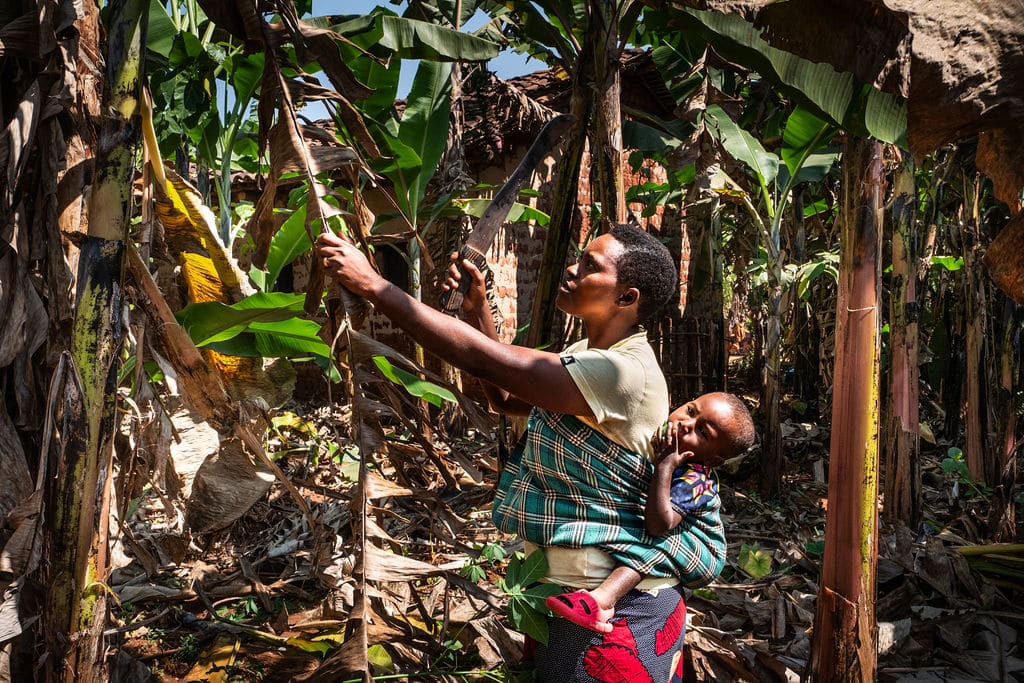
37-year-old Christella has had to start all over again, far from her family, working hard to meet her three daughters’ needs alone. © Loïc Delvaulx
Christella knows that she can only rely on herself to offer her children a future from now on. All the same, the young woman does not regret her choice. Although life is harder in Ngozi, it is also more peaceful. Anyway, Christella has a plan: she is going to receive goats soon. And that will change everything.
“A few months ago, I found out I was on the waiting list to be given some goats”, the young woman explains. “I was delighted, because most people on my hill keep cattle, but I don’t even have a goat or sheep. I said to myself: this is it. I’m going to have my own animals too, and manure that I won’t need to pay for!” Fertilising her land will enable Christella to increase her production and sell some of it to improve her house. She wants to replace the tiled roof with more waterproof sheet metal, to prevent it from leaking in the rainy season.
Beyond tragic circumstances, resilience
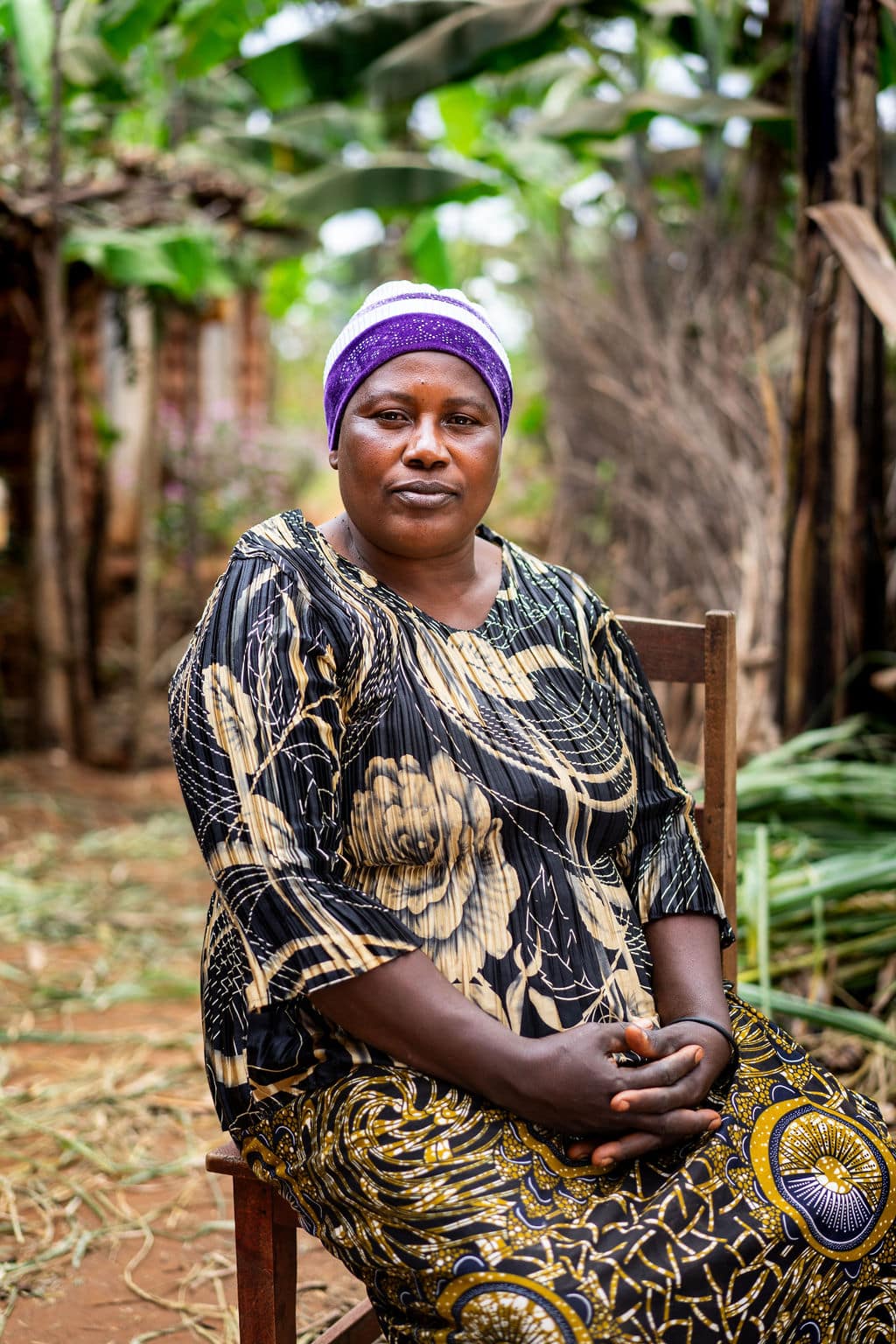
56-year-old Ménédore worked hard for years to feed her seven children after her husband left her. Vétérinaires Sans Frontières Belgium gave her a new start five years ago. © Loïc Delvaulx
Unfortunately, stories like Christella’s are common among our beneficiaries. Single or widowed mothers are a priority among the populations we work with in Burundi and elsewhere. Besides their tragic circumstances, they often have something else in common: resilience. And goats are a real asset when it comes to changing their lives. Goats as a way to escape poverty? You only have to meet Ménédore Nyabenda to be convinced that it’s true.
It’s a fine morning in June when the 56-year-old matriarch welcomes us to her home on Kavumu hill, a stone’s throw from the road and the local shops. She takes us on an enthusiastic tour of her property, introducing us to her goats, her lovely cow and its newborn calf. There is nothing in her proud, cheerful attitude that hints at the difficulties she has gone through. Nevertheless, Ménédore’s life has not been plain sailing.
In the early 2000s, when she was 34 and already had five children, Ménédore brought twins into the world. Shortly after they were born, her husband abandoned them, frightened by the burden of all those mouths to feed. The years that followed were long, full of worries and deprivation for the young woman. While her eldest children were at school, she worked the fields from morning to night with two babies on her back to feed her little clan and pay their school fees. Her efforts weren’t always enough, like the time when she didn’t have enough money to pay for her son’s school uniform. The memory still makes her feel guilty, years later.
“My goats were the foundations of my development”
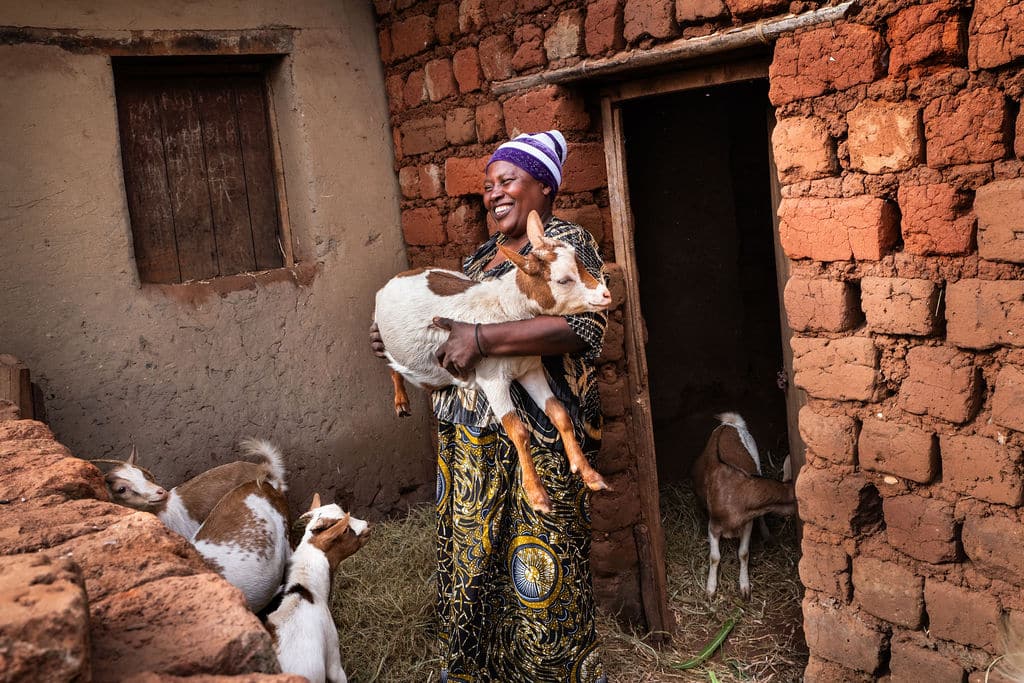
Ménédore is proud to show us her strong goats in their stall: “When I received my goats, fortune smiled at me. They were the foundations of my development.” © Loïc Delvaulx
Fortunately, all that is in the past. Five years ago, Ménédore’s fortunes finally took a turn for the better: she received some goats and all the support we offer as part of our holistic approach.
“When I received my goats, fortune smiled at me. They were the foundations of my development. Today, I have nothing to complain about: all I have to do is look after my animals, and I employ people to work my land. My income is sufficient to send my children to university: two of my daughters have management and accounting degrees, and my son is about to start higher studies in agronomy. I can pay their tuition fees and accommodation in Bujumbura without difficulty. If I hadn’t had my goats, that would have been impossible.”
The discovery of abundance and the end of worry
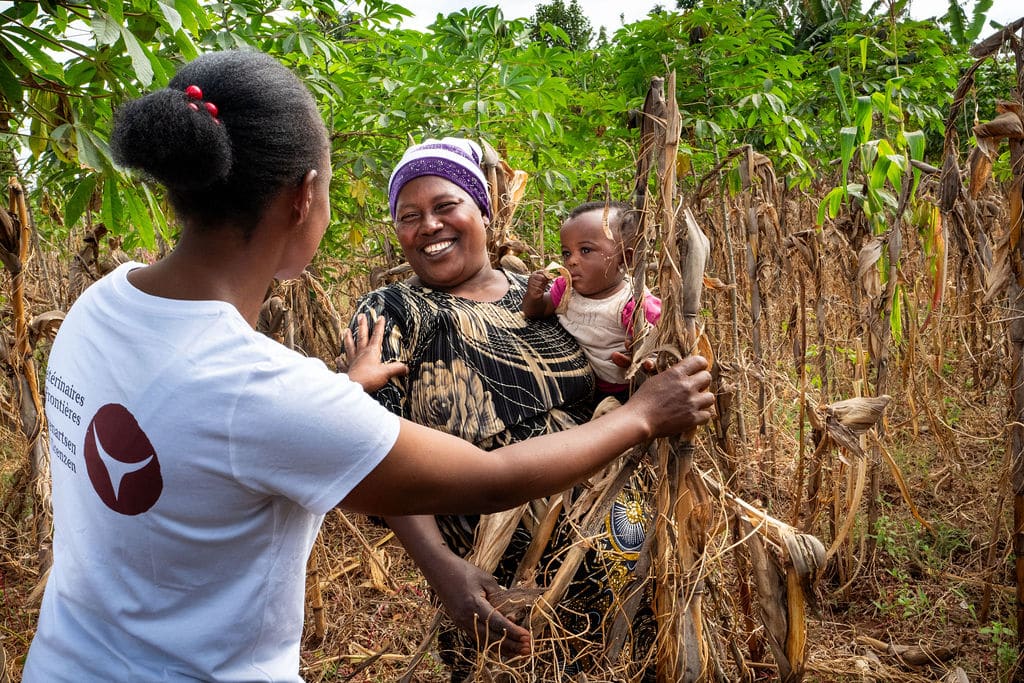
Our colleague Emmanuella has supported Ménédore for the past five years. The facilitator regularly visits her to advise her on agricultural practices and livestock keeping. © Loïc Delvaux
In the past, Ménédore’s crops hardly yielded anything at all. That was her primary concern: with no manure to fertilise the soil, her production was poor. Now everything has changed, as we see from the stock records she proudly flips through in front of us: this season, she has stocked up 880 kg of sweetcorn, 217 kg of rice and 332 kg of beans. That doesn’t include the amounts she and her large family have consumed themselves. These are prodigious quantities, and Ménédore no longer even needs to tire herself out by harvesting them in person: she employs a foreman whose job it is to find labourers to work her five big fields in the marshes.
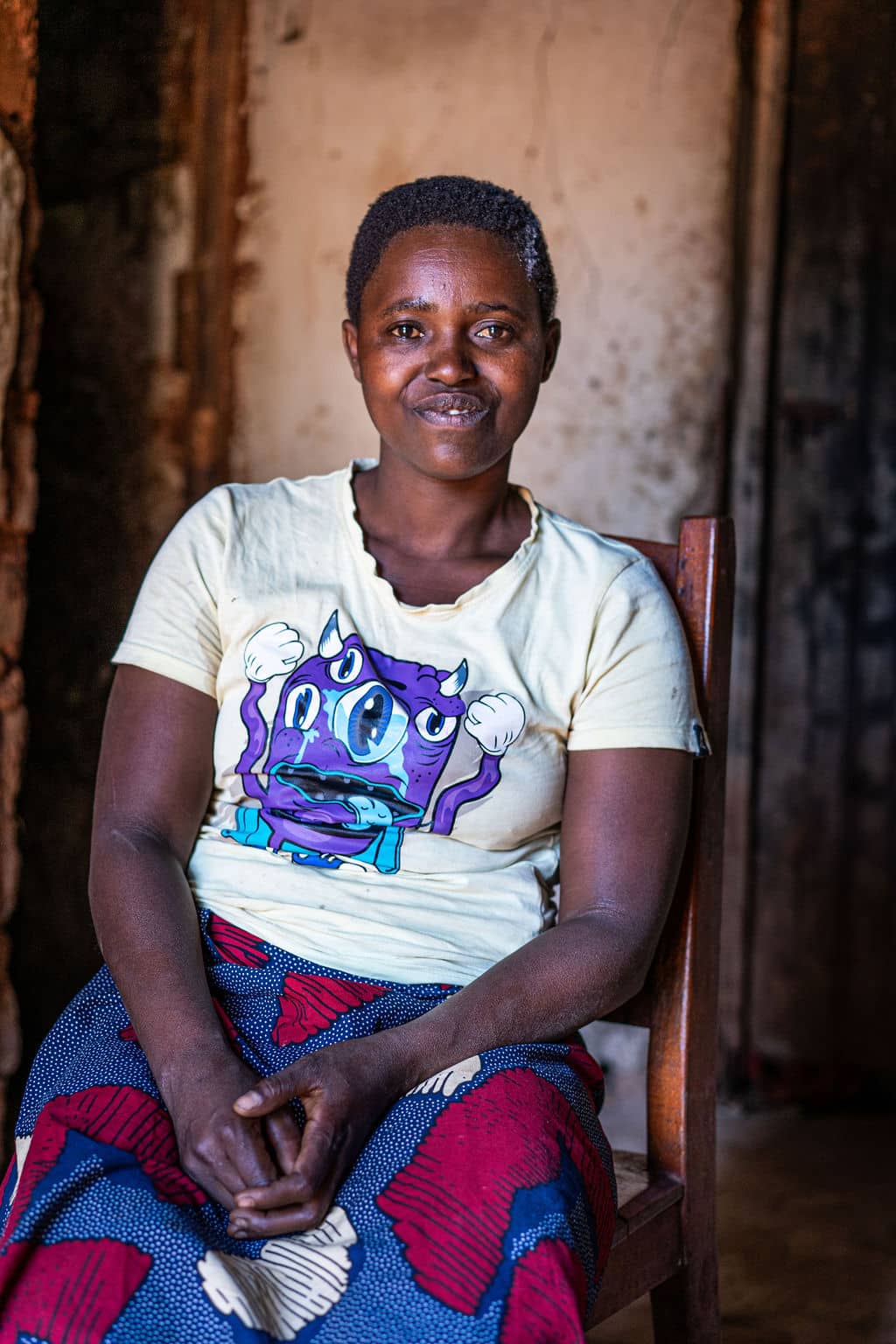
Christella is confident about the future: soon she’ll receive her goats, and everything will change. © Loïc Delvaulx
The 56-year-old has various plans for the future. Convinced of the economic potential of livestock keeping, she intends to take up poultry farming. First, though, she plans to improve her home, which she has already extended considerably in the past few years, using cement to make it more robust and fitting a sheet metal roof. She also intends to bring in electricity and water, and to buy land for each of her children where they can build houses of their own.
Like Ménédore, Christella is certain of one thing: the animals will soon protect her family. But she has no intention of sitting and waiting for life to take its course. Although she doesn’t have any animals of her own yet, she has already started trying her hand at livestock keeping, and she enjoys it. Recently, neighbours gave her two goats and two rabbits. That was a real boost, testifying to the trust she has earned in her new community. When the animals have young, she will be able to keep one kid and one baby rabbit in return for the care she has given them. In the meantime, she can already benefit from free manure to fertilise her fields. This first step bodes well for a far better future for herself and her daughters.

